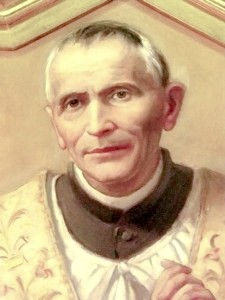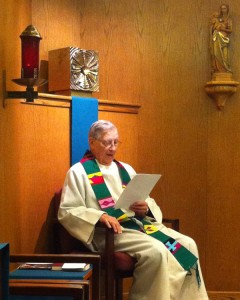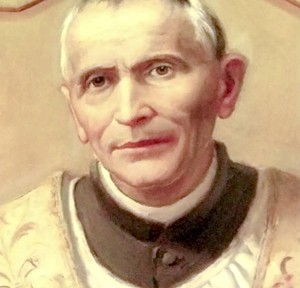An Anecdote

Fr. J.B. Francesia speaks of Fr. Rua as of a man or deep prayer. Always first at his place in church for the community meditation, he would kneel motionless throughout, with his face resting on the palms of his hands, holding a white handkerchief.
On February 23, 1887 early in the morning, an earthquake struck that was felt throughout northwestern Italy, in Turin and beyond. Father Francesia goes on the relate Fr. Alexander Lucchelli’s eyewitness account of the earthquake. Fr. Lucchelli recalled the event when delivering the funeral oration at Fr. Rua’s month mind Requiem Mass celebrated at Savona on May 1910. He described the scene:
“On the morning of February 23, 1887 we, the Salesians of the Oratory, were gathered for our meditation in the chancel of the church of Mary Help of Christians. All of a sudden, we felt the ground reeling violently under our feet, accompanied by the frightening din of a thousand objects violently shaking and clashing. It was as though a gigantic monster was trying to crush the church with its steel claws. ‘Earthquake! Earthquake!’ was the cry. All of us, thoroughly terrified, dashed out to the safety of the courtyard and kept our eyes on the cupola of the church, expecting it to collapse at any moment. But when the shocks ceased the church seemed to have suffered no damage. So we went back to the chancel only to find (lo and behold!) that Fr. Rua had not moved from his usual place and prayerful posture. *
Had he been unaware of what was happening? It’s hard to believe! Or perhaps he had drifted off into a trance. Or perhaps even in that frightening moment Ft. Rua had not left off his prayer.
- *For this eyewitness account of Fr. Rua at prayer during the earthquake of 1887, see D. Michele Rua, primo successore di Don Bosco, Memorie del Sac. G.B. Francesia 2nd edition (Turino: Ufficio delle letture Cattoliche 1911), p. 105.
- For a sketch of Blessed Michael Rua’s life, see: http://www.sdb.org/index.php?linguanewsletter=2&ids=12&sott=18&detsot=6&ty=2
Feast Day Homily – 29 October

1Cor 12:31–13:13 & Matthew 6:24-34
First Reading Commentary
Our first reading, from the first letter to the Corinthians, is perhaps the best known and most admired passage in all of St. Paul’s writings, the passage in which he extols and characterizes Christian love.
It is helpful to bear in mind that this passage immediately follows upon the one in which Paul insists that the variety of spiritual gifts or charisms is meant to serve rather than disrupt the organic integrity of the Christian community.
It is by an extension of this thought that in the present passage he contrasts all of these individual charismatic endowments with “a way that surpasses all the others.” This is the “way” of Christian love. And Christian love is not a gift that is allotted to certain Christian individually but rather the essential gift of divine life that all Christians share in common.
Indeed, whereas the charisms are particular manifestations of spiritual vitality, love is the principal aspect of that vitality itself.
Consequently, apart from love, the exercise of any of the charisms, whether the gift of tongues, or prophecy, or sufficient confidence for miracles, or even heroic extremes of self-sacrifice, is simply pointless and absurd,
This is, of course, Paul’s basic indictment of the Corinthian charismatics, but it transcends this historical context and constitutes a fundamental declaration of Christian religious priorities.
Paul is still thinking of the spiteful and pretentious uses to which the Corinthians put their spiritual gifts when he proceeds to characterize the love he is talking about. It is patient, kind, and constant, free from every trace of jealousy, ostentation, snobbery, rudeness, egotism and animosity.
Where vices of the latter sort flourish, love is absent. And although charismatic phenomena may still be present, they serve no good purpose.
The passage concludes by observing that the other gifts, unlike love, are temporal rather than eternal attributes. They belong to the immature and incomplete phase of Christian life, whereas love is the outstanding feature of that life’s eternal fulfillment.
Gospel Commentary
The Gospel reading contains two passages from Jesus’ Sermon on the Mount that are closely related in their present context.
The first passage gives striking expression to the idea that among one’s competing values there has to be an order of priority. Different allegiances lead to conflicts that must be resolved, and can only be resolved by choosing one over the other.
This general idea is given very specific application by the well-known saying, “You cannot give yourself to God and money.”
It is the notion of giving oneself to money, with all that is implied, that provides a natural transition to the second passage, which combines a condemnation of anxious preoccupation with material security, and an exhortation to peaceful reliance on the providence of God.
Readers have often felt that this passage comes dangerously close to encouraging a kind of lazy improvidence, and it is important to note just what is being denounced.
The prohibition is “Do not worry about your livelihood,” which is quite a different thing from not providing for one’s livelihood. It is not the virtue of prudence but the vice of anxiety that come under attack.
For whereas prudence is precisely characterized by moderation, anxiety is essentially immoderate and ultimately imprudent.
The rhetorical questions, “Is not life more than food” and “Is not the body more valuable than clothes” point to the hierarchy of values that anxiety invariably distorts.
